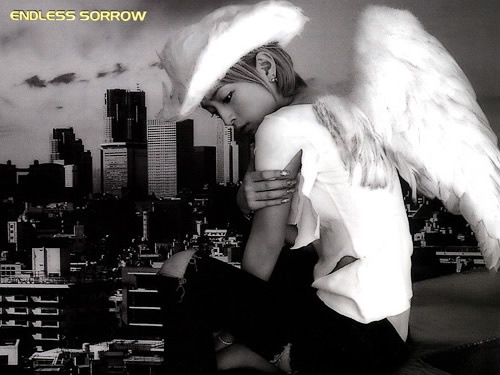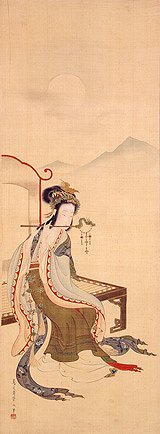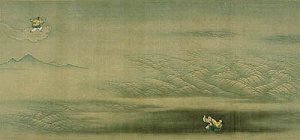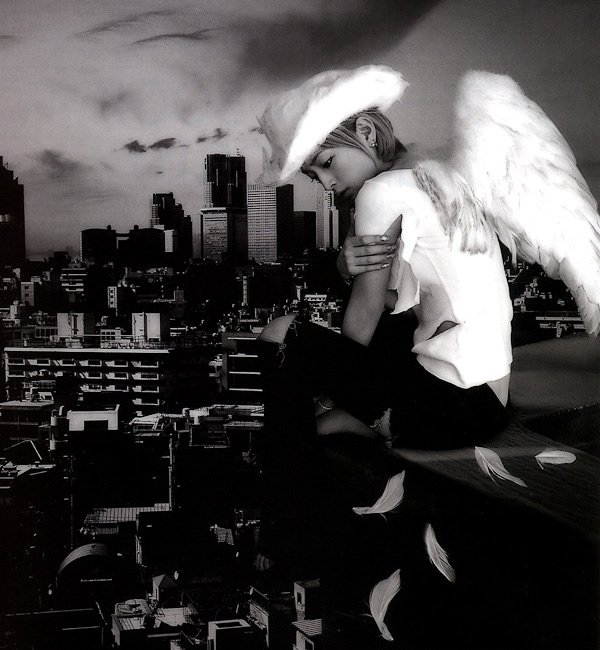
|
I always thought that the "Endless Sorrow" is one of the best music videos I've seen and still, in 2013, think that it is correct. The detailed screen captures from it are presented HERE. The words of the song are not very much relevant to the video... I am not a translator from Japanese and below is my interpretation of what the lyrics are: |
|
What
if you're alone and suddenly cannot see anything,
What if despite that you try to walk forward? Come here and take my hand. Even if you have only one wing Even if I have only one wing left What if there was nothing you could believe in, What if all that's left is despair? Please hear this prayer In the age of angels without wings Even if you have no wings left I have just one wing left, so... Together... together |
| Why the angel both on the CD cover and in the video clip have only one wing...? Below is my personal opinion that, of course, may not be the correct one. The information has been collected on the Internet and trimmed to fit the page. Any corrections/comments are welcome... |
| In the "Tale of Genji" written approximately one thousand year ago by Murasaki Shikibu (b. 978) the "Song of Everlasting Sorrow" by the Chinese poet Po Chu-Yi (772-846) is cited as follows: |
|
"In the sky,
as birds that share a wing.
On earth, as trees that share a branch." |
| This appeared to me as a link between the song and the poem, and what interests us now is the ancient "Song of Everlasting Sorrow" (the full text of the poem in the translation by A.S. Kline is presented at the bottom of the page). |
 |
"The Song Of Everlasting
Sorrow" is based on a true story of how Yang Kwei-fei (18th century
painting by Chobunsai Eishi to the left) rose from obscurity to win
the heart of an emperor, before causing his downfall.
|
|
|
Emperor Hsuan Tsung, who
ruled from 713-756, was a wise ruler during the early years of his reign.
Then the emperor became infatuated with the young woman. In 741 Yang
Kwei-fei abandoned her husband and in 745 the emperor made her his "Precious
Consort."
|
||
|
From this time on, Hsuan
Tsung neglected affairs of state and allowed his court to lapse into
decadence. Meanwhile, Yang Kwei-fei caused a scandal with her close
relationship with general An Lu-Shan. Several natural disasters and
military defeats caused unrest in the empire, culminating in a rebellion
led by An Lu-Shan in 755. As the victorious rebel forces advanced on
the capital, Hsuan Tsung and his court fled. On the way, the imperial
guard mutinied and killed Yang Kwei-fei's brother, the prime minister.
Blaming the Yang family for the empire's troubles, the troops forced
the emperor to have his beloved concubine strangled at Ma-Wei posting
station on the Wei River...
|
||
|
When the T'ang dynasty
regained control and Hsuan Tsung finally returned to the capital, he
was seized by remorse and used a Taoist priest Luo Gongyuan to contact
Yang Kwei-fei in the netherworld (17th century scroll by Kano Sansetsu
showing the search of Luo Gongyuan for the murdered Yang Kwei-fei is
shown below).
|
||
|
The priest met with Yang Kwei-fei in the Land of The Immortals, bringing back to the emperor half a gold hair comb, which the emperor knew belonged to her, and a message: |
 |
|
|
‘Our spirits belong
together, like these precious fragments,
Sometime, in earth or heaven, we shall meet again.’... ‘On that Seventh night, of the Herdboy and the Weaver, In the silent Palace we declared our dream was To fly together in the sky, two birds on the same wing, To grow together on the earth, two branches of one tree.’ |
||
| The Herdboy and the Weaver girl are the stars Altair in the constellation Eagle and Vega in the constellation Lyra. They are lovers separated by the Milky Way. She is allowed to visit him once a year on the seventh night of the seventh month, the first month of autumn, when she passes across the heavens as a meteor, or crosses to him on a bridge of birds. |
 |
|
|
The meeting of the priest
and Yang Kwei-fei is shown on the 19th century painting by Hokkei:
|
||
 |
Hsuan Tsung had Yang Kwei-fei sculpture made in the image of Avalokitesvara (Kannon), which was brought to Sennyu-ji Temple in Kyoto by the priest Tankai in 1255. It is located in a small Kannon-do in the temple grounds and known as the Yokihi Kannon or Empress Yang. The picture of it (from Sennyu-ji Temple brochure) is shown to the left. | |
|
The Song of Everlasting Sorrow China’s
Emperor yearning, for beauty that shakes a kingdom, |

 |
||||
